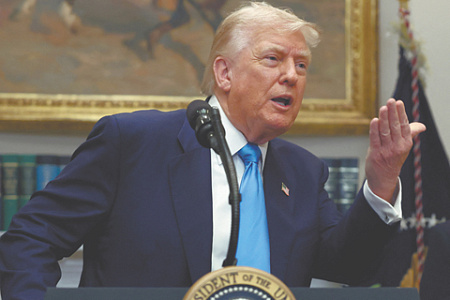
U.S. President Donald Trump is preparing to unleash a wave of trade tariffs this August, directly targeting key members of the BRICS economic bloc. The measures, aimed at China, India, Brazil, and South Africa, signal a significant escalation in using economic leverage for political ends, a move with broad implications for global diplomacy and trade.
The new tariffs are not merely about rebalancing trade deficits. President Trump has explicitly framed his actions as a response to the existence of BRICS itself, an organization he views as a direct challenge to American influence. “BRICS is basically a group of countries that are against the United States,” Trump told reporters, specifically citing India’s membership as a justification for new duties on its goods.
At the heart of Trump’s animosity towards the bloc appears to be its nascent discussions about creating a new reserve currency, a potential long-term threat to the global dominance of the U.S. dollar. The President issued a stark warning against any such move, vowing that he “will not let anyone attack the dollar,” positioning the trade dispute within a larger battle for financial supremacy.
India faces a complex web of economic penalties. Beyond a general 25% tariff on its goods—with some products like copper pipes facing duties as high as 50%—Trump has threatened an additional “penalty” for New Delhi’s continued strategic and economic partnership with Russia. Citing India’s major purchases of Russian energy and military equipment, Trump has floated the possibility of a staggering 100% tariff if these ties are not curtailed.
The most severe measures are reserved for Brazil, which is set to face a 50% tariff on its products. The move is widely seen as direct intervention in Brazilian domestic politics, aimed at pressuring the government over the prosecution of former President Jair Bolsonaro, a staunch Trump ally. Trump has labeled the case against Bolsonaro, who faces charges related to an alleged coup attempt, a “witch hunt” and has coupled the tariffs with personal sanctions against a Brazilian Supreme Court justice overseeing the case.
However, the White House has carefully calibrated its economic attack on Brazil to minimize domestic blowback. Crucial Brazilian exports to the U.S., including aircraft, oil, gas, iron ore, and even orange juice, have been exempted from the new tariffs. According to the American Chamber of Commerce in Brazil, this means over 40% of the country’s exports will be spared, a clear attempt to shield American consumers and industries from price hikes.
The targeted nations have responded with a mix of defiance and diplomacy. Brazilian President Luiz Inácio Lula da Silva has adopted a firm stance, insisting his country will negotiate as a “sovereign nation” and not be intimidated, a position that has reportedly boosted his domestic approval ratings. Meanwhile, the Kremlin has sought to de-escalate the rhetoric, with spokesperson Dmitry Peskov describing BRICS as a cooperative partnership not directed “against any countries”—a view President Trump evidently does not share.
Despite the aggressive posturing, analysts suggest there may still be room for compromise. The decision to delay the implementation of tariffs on Brazil by a week is seen by some experts as an opening for negotiation. A multi-front trade war against major economies like China, India, and Brazil would inevitably impact American consumers through higher prices, creating a powerful incentive for the White House to find an off-ramp before the tariffs fully take effect.
